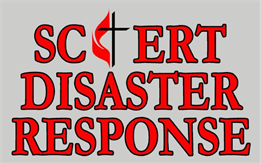 Tt’s hurricane season 2015…..
Tt’s hurricane season 2015…..
But first some good news!
A team of hard working individuals representing all Districts across the State, ERT and UMVIM, Conference Staff; and with the blessing and support of the Bishop and Cabinet has developed the first SC Conference Disaster Response Plan. Included in the plan is a template for the development of local church plans.
District Representatives will be making contact with local churches to arrange for planning, training and any other assistance needed to move ahead. It is incumbent upon us to prepare our churches and our communities for both hurricane season and other potential disasters.
Hurricane season runs from June 1 to November 30. The affect of hurricanes is heavy rains, strong winds, floods, and coastal storm surges. The damages may include destruction of homes and other facilities and the possibility of injury and loss of life…much of which is preventable with good planning and preparation.
Other affects may include: death or injury to animals, disruption of transportation and utilities as well as communication shutdown.
Because hurricanes are identifiable and warnings possible; the most effective method to avoid injury or loss of life when a hurricane is immanent is evacuation. Planning for evacuation includes a destination, personal needs such as medications, a place to stay and family coordination and contact information. Follow the instructions of local and state officials and don’t wait until the last minute!
Some things to consider when planning for your family, community, church:
- Know what the evacuation routes are from your area of the State.
- Do an insurance check-up with your insurance agency of choice.
- Know where you will stay, and if you need a shelter after evacuating, download the American Red Cross Shelter Finder App at redcross.org/mobile-apps/shelter-finder-app.
- Remember not all hotels allow pets.
- Set up a communication plan for your family as well as a meeting place locally and out of town.
- Acquire first aid training and have a first aid kit on hand that you would also take with you when you evacuate.
- Develop a list of needed supplies to have at home and for evacuation, for more information see ready.gov/build-a-kit. Note some things include, prescriptions, personal hygiene needs, children and pet needs, important papers and priceless items.
- Plan to “not” have access to stores and banks. Have at least a 3-5 day supply of non-perishable food and water as well as some cash on hand. Also plan to not have full utilities such as power and water for days and possibly weeks.
- Use extreme caution when traveling after a hurricane, such as avoiding down power lines and rising floodwaters.
- Have a home inventory including pictures for possible insurance purposes, store away from your home in a safe place and consider giving your insurance company a copy.
- Don’t forget friends and neighbors that may be at a greater risk.
*Source of information: fema.gov – How To Prepare for a Hurricane.
For additional information go to:
Institute for Business and Home Safety Protect Your Home Against Hurricane Damage: www.disastersafety.org/hurricane
National Hurricane Center: www.hurricanes.gov
